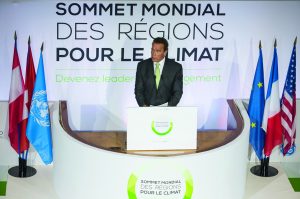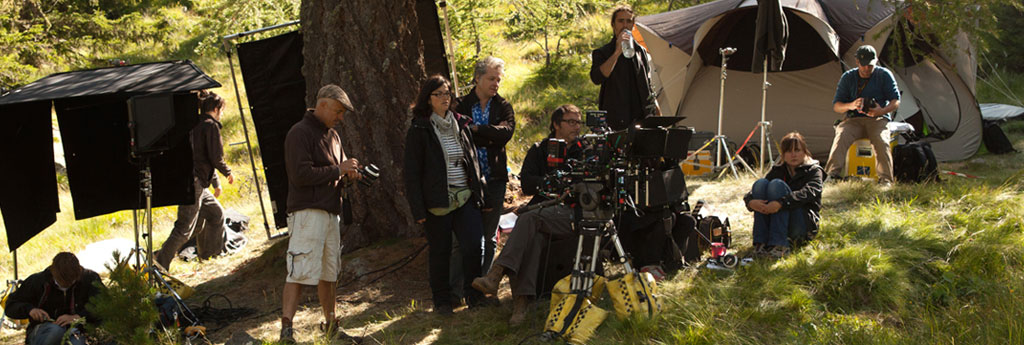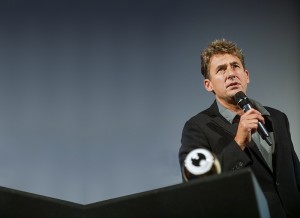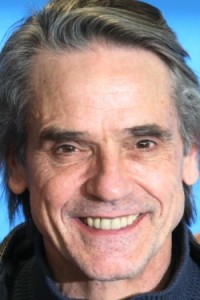
Hollywood star, politician and environmentalist Arnold Schwarzenegger launched the nonprofit environmental organization R20.The mission is to help sub-national governments around the world to develop low-carbon and climate resilient economic development projects.
What are the biggest obstacles and challenges to fighting climate change?
I believe that if we want to fight climate change; if we want a green energy future; if we want real action that matches our vision, we must do a better job of communicating. We have to talk about things that matter to people. We should look at this like a four-legged stool; right now we’re using a one-legged stool. A one-legged stool is wobbly and unbalanced. A four-legged stool is strong. The first leg is jobs. Who could be against this? The second leg is national security. For decades, industrialized democracies have been in the terrible position of having to purchase oil from foreign countries, sending vast amounts of money outside their borders. A green and sustainable energy future would end this dependence and give us energy freedom. The third leg is health. Pollution kills. One study by Cornell University concluded that a staggering 40 percent of deaths worldwide are caused by water, air and soil pollution. Why is there no uproar or protests in the streets? Because we are failing to communicate — it’s our job to get that message out. And the fourth leg, of course, is climate change. You can have the best project in the world but if you don’t promote and market it the right way, no one will buy it. You have nothing.
The R20 addresses all four legs of the stool. In partnership with the foundation and investment community, the R20 is proving to be the driving force to take full advantage of new technologies in order to strengthen local economies, improve public health, create new green jobs, lower greenhouse gas emissions and reduce our energy consumption.
 What impact can the film and media industry make?
What impact can the film and media industry make?
You know I’m a huge fan of the film industry! And I believe that the film and media industry can make a huge impact. Now in the age of social media messages can be spread throughout the world — videos can go viral and can reach people in all corners of the world. I feel like this provides a huge opportunity. As I mentioned above, the media has a powerful role to play in the fight against climate change.
Through films, television, and all media outlets, we must continue to deliver the message that solutions are out there and are happening now. We have to make it attractive for people to take action. Movies like Avatar, The Day After Tomorrow, and documentaries like Years of Living Dangerously, which I was proud to be a part of, have been very popular, reaching and inspiring millions of people. And I believe films in particular can really inspire and make people want to take action. It’s great to see some of my film-industry friends working with climate related organizations to push forward those messages.
What approach is your organization R20-Regions of Climate Action taking?
The mission of the R20 is to promote and implement low-carbon projects at the subnational level that are designed to produce local economic and environmental benefits in the form of: reduced energy consumption and greenhouse gas emissions; strong local economies; improved public health; and new green jobs. Through its members, partners and observers, the R20’s activities connect more than 600 subnational and local governments around the world in order to create clean energy projects that are effective in protecting the environment and the health of our people.
The brilliant thing about the R20 and what differentiates us from other organizations is that we are a coalition made up of governments, finance, NGOs, academia, clean technology developers, and business. This allows for us to develop a truly integrated action plan, to develop a low carbon, green economy everywhere.
The R20 teaches regional governments about the different technologies that are available and connects them to the right companies. And we are aware that it isn’t just about the know-how, it’s about finance. There is tremendous opportunity for foundations, philanthropists, social/impact investors, and others to be a part of a real solution by joining this unprecedented group of partners.
The R20 is in a way a matchmaker ― you bring the investment capital or grant funding and we connect you to a willing government and technology partners that can successfully implement low-carbon projects. I believe this is an approach that could be the catalyst for real change. Imagine removing the barriers to finally bringing finance into the picture and you will see the rapid deployment of clean-energy projects that will improve the global economy, lower emissions, and provide new jobs. The government members of the R20 are eager to open the door for investment in order to facilitate a variety of projects like renewable energy production; boiler efficiency upgrades; waste- to-energy projects; and replacing old street lights with efficient solar- powered LED lighting.
What kind of projects are emerging from R20’s Green Finance Network?
I am very excited to say that we have projects around the world — Algeria, Burundi, Brazil, China, Indonesia, Nigeria, etc. In Oran, Algeria, for example, we are working with the national and provincial government to transform the current waste-management system into an efficient money-maker by introducing waste sorting, recycling, and composting. In just a few months since the project has been operational, we’ve sorted and recovered 113 tons of waste! The local communities where we launched the household recycling initiative have been incredibly supportive and proud to be part of this movement. We are also working with Dapeng in China to overhaul their waste management processes.
R20 recently sealed a deal between the government of Mali and our partner Akuo Energy to build a 50 MW solar PV plant in Kita. We worked with our investment network to structure and finance the project, and helped both the government and investors come up with a low-risk, win-win deal. This project is going to increase the energy supply of the whole country by 10%, so we’re very happy to have been able to help make that happen. This is going to enable us to embark on a huge initiative to deploy 1 GW of renewable energy across West and Central Africa.
Do you expect any policy changes to result from COP21?
I have great faith in the outcome of the Paris summit. I believe that we came out of the Copenhagen summit learning valuable lessons about what not to do, and as I’ve noted previously, we learned that taking action regardless of the negotiations is the only path forward.
Of course, most promising is the ongoing cooperation that was launched at a summit meeting held in 2014 where an historic accord was solidified by President Obama and President Xi Jinping, who both pledged to enact policies to cut emissions significantly. President Obama pledged that the United States would reduce carbon emissions up to 28% by 2025, while President Xi vowed that China would halt its emissions growth by 2030. That announcement was a fantastic breakthrough after decades of deadlock on efforts to forge an effective global accord on climate change. Then, as a follow up in September of this year, President Obama’s top climate change negotiator met with his Chinese counterpart to announce joint actions by cities, states, and provinces in both countries to reduce greenhouse gas emissions. These developments make me very hopeful that by continuing this level of cooperation we will have a positive and possibly unprecedented outcome at COP21.
Finally – I’m most confident because of the leadership of UN Secretary General Ban Ki-Moon. He is a tremendous leader and visionary and is deeply committed to a positive outcome at COP21. He recently remarked that an agreement in Paris “must mark a decisive and irreversible turning point in the world’s collective response to the climate challenge.” I believe that with his steadfast mission we will succeed.













 Robert Redford
Robert Redford Hannes Jaenicke
Hannes Jaenicke Nic Balthazar
Nic Balthazar Nadeshda Brennicke, Actress
Nadeshda Brennicke, Actress Darren Aronofsky, Director, Noah / Jury President, 65th Berlin International Film Festival
Darren Aronofsky, Director, Noah / Jury President, 65th Berlin International Film Festival Tim Bevan
Tim Bevan Thekla Reuten
Thekla Reuten Rachael Joy
Rachael Joy Nikola Rakocevi
Nikola Rakocevi Nadja Schildknecht
Nadja Schildknecht Michael Bully Herbig
Michael Bully Herbig Lars Jessen
Lars Jessen Helen Hunt
Helen Hunt Douglas Trumbull
Douglas Trumbull Dieter Kosslick, Director Berlin International Film Festival
Dieter Kosslick, Director Berlin International Film Festival Benoit Delhomme
Benoit Delhomme Jeremy Irons
Jeremy Irons